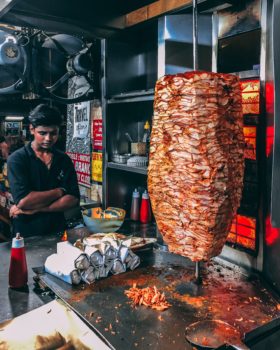Tapori Language of Mumbai Posted by Nicole Herbert Dean on Mar 15, 2021 in Culture, Hindi Language, Vocabulary
India भारत is a subcontinent उपमहाद्वीप, and each state राज्य has its own language भाषा and culture संस्कृति, but Mumbai is a unique अद्वितीय city with its own language and culture. Mumbai is a commercial hub वाणिज्यिक केंद्र, attracting people from different अलग parts of the nation राष्ट्र. When people of different cultures and languages live together they create new cultures and languages. The Tapori language is one such language with its own culture.
Mumbai the Tossed Salad
It is a privilege सौभाग्य to grow up in Mumbai as one is able to learn many languages. One learns not only English and Hindi but other अन्य languages such as Marathi, Gujarati, the Gujarati-Persian dialect बोली spoken by Parsis and various other Indian languages. After all, Mumbai is a tossed salad bowl, not a melting pot and all these wonderful अद्भुत cultures and languages while holding its own as a standalone ingredient, together add flavor स्वाद and fullness परिपूर्णता to the salad that is Mumbai.
Tapori Language
These languages gave rise to a language that is native मूल to Mumbai only through their interaction बातचीत. This language is called Tapori टपोरी. You cannot find the Tapori language anywhere else in India or for that matter in textbooks पाठ्यपुस्तकों. The reason is because it is a mixture मिश्रण of words and phrases from different languages.
Tapori originated उत्पत्ति from the Marathi language and is a mixture of Marathi, Gujarati and of course Hindi. It means ‘blossomed’ or ‘fully fertile’ in the Marathi language. However, it means ‘hoodlum’ बदमाश, and ‘good for nothing’ when in use in Mumbai. It is generally not looked upon favorably अनुकूल by the upper classes उच्च वर्ग of Mumbai society समाज.
Tapori Culture
The underlying अंतर्निहित connotations अर्थ associated with Tapori, is that those who speak it are cool and well versed अच्छी तरह से निपुण with the ways of the street.
A distinct विशिष्ट culture accompanies this language in the form रूप of Tapori style. Tapori in essence सार is street talk. It has its dark side as the rough elements of the city speak it. Tapori has many words that are considered माना जाता slang and not decent सभ्य.
Thugs and street gangs as well as little kids that one sees panhandling at the station or at the street corners speak Tapori. Kids adopt this language deliberately to reveal a toughness that they need to survive the streets.
Educated शिक्षित people also speak Tapori in the marketplaces बाजारों as they haggle मोल-भाव करना with shopkeepers over prices. Speaking Tapori in this context संदर्भ, lends one to more favorable अनुकूल outcomes परिणाम, as it shows an identification with the social status सामाजिक स्थिति of street hawkers.
Tapori and Bollywood
Nowadays, Bollywood filmmakers cast their protagonists as Taporis. This shift बदलाव, in casting heroes as Taporis instead of upright ईमानदार, well-mannered, and well-spoken gentleman सज्जन, like those of past films, reveal खुलासा a shift in the culture of Mumbai. It looks like it is more accepting स्वीकार of street talk and street style now. We remember याद Sanjay Dutt, the famous Bollywood actor, for his famous Tapori character Munnabhai in the movie, Munnabhai MBBS. Also, as an audience दर्शक we love Ranbir Kapoor for his role as a Tapori in Besharam.
Tapori is therefore here to stay. If the movers and shakers of Bollywood accept it then so do we.
Tapori Words
Some examples of Tapori language are:
Tapri टपरी– street stall
Chotay छोटे– little boy who works at the stall
Boss बोस– addressing a friend, unrelated stranger or prospective customer
Cutting chai कटिंग चाय – half a cup of tea

Build vocabulary, practice pronunciation, and more with Transparent Language Online. Available anytime, anywhere, on any device.






